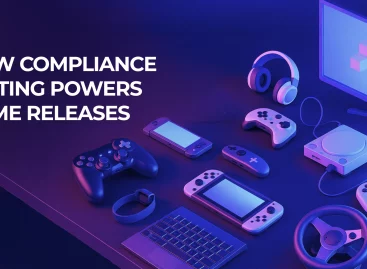- QATestLab Blog >
- Game Testing >
- Compliance Testing >
- Compliance Testing in iGaming: 5 Common Mistakes and How to Avoid Them
Compliance Testing in iGaming: 5 Common Mistakes and How to Avoid Them

Compliance failures are among the most serious risks facing iGaming platforms today. Missed requirements or incomplete checks often result in license rejections, regulatory penalties, and reputational damage. As regulators continue to tighten standards worldwide, flawless compliance has become a prerequisite for sustainable growth.
Engaging an expert testing provider ensures that platforms are properly assessed against regulatory requirements, reducing the risk of errors and supporting faster approvals.
In this article, we examine the most common mistakes made during compliance testing in iGaming, explain how to avoid them, highlight the advantages of early verification. Additionally, we’ve prepared a checklist of essential checks before launching into new markets.
Key Compliance Testing Mistakes in iGaming
1. Misinterpreting Regulatory Requirements (MGA, UKGC)
A common cause of compliance failures is the misinterpretation of requirements from regulators such as the Malta Gaming Authority (MGA) or the UK Gambling Commission (UKGC). This often happens due to overlooked local differences (e.g., AML updates) or underestimating regulatory changes (e.g., the MoU between MGA and UKGC).
Consequences: Financial penalties, licensing delays, and even market bans.
How Expert QA Support Helps: QA engineers audit platforms against MGA/UKGC standards, including the latest AML regulations and technical requirements, simulate regulatory inspections, and provide actionable recommendations to fix discrepancies.
2. RNG Certification Failures
Failure to obtain Random Number Generator (RNG) certification, mandatory for proving fairness, often occurs due to unaccredited algorithms, missing audits, or a lack of transparency.
Consequences: Loss of users’ trust, launch delays, and blocked licenses from regulators such as the UKGC or MGA.
How Expert QA Support Helps: Thanks to their expertise and structured approach, expert QA engineers review source code and validate RNG algorithms against ISO/IEC 17025 standards. These practices prepare systems for audits by GLI or eCOGRA.
3. Weak Responsible Gaming Features
Deposit limits, self-exclusion tools, or AI-driven monitoring are often poorly implemented or incomplete. This violates MGA and UKGC requirements, both of which emphasize player protection.
Consequences: Fines, reputational damage, and increased regulatory scrutiny.
How Expert QA Support Helps: QA engineers can simulate high-risk behavior to validate deposit limits, self-exclusion flows, and AI monitoring. Testing against iCAP standards ensures gaps are detected early and compliance is achieved.
4. Poor Documentation Practices
Incomplete records of audits, client data, or tests, along with undocumented fixes or ignored AML/technical reporting requirements, complicate compliance checks. This is especially critical in cloud-based systems, where transparent records are mandatory.
Consequences: Audit delays, costly retesting, and regulatory fines.
How Expert QA Support Helps: QA engineers review audit logs, test records, and AML reports for completeness. Automated checks and standardized templates help teams prepare for regulator inspections and avoid costly rework.
5. Ignoring Localization and Market-Specific Needs
A universal approach often overlooks language, currency, cultural, and regulatory specifics, or account segmentation (free vs. premium). Missing features, such as a Portuguese interface in Brazil or local payment systems (Pix, Boleto), directly reduce conversions.
Consequences: Drop in deposit conversion, fines for non-compliance, and reputational damage.
How Expert QA Support Helps: QA specialists validate translations, test cultural appropriateness, and ensure seamless integration of local payment systems (e.g., Pix, Boleto in Brazil). This ensures compliance with local regulations, cultural alignment, and improved deposit conversion rates.
Practical Checklist for Successful iGaming Compliance Testing
Why Automation Matters for Compliance Testing in iGaming
During compliance testing in iGaming, relying solely on manual check can make the process lengthy and costly. This is particularly evident with complex iGaming requirements such as RNG certification, AML procedures, responsible gaming tools, and localization. Test automation provides clear advantages:
Speed to Market
By leveraging automated testing, compliance checks such as RNG certification or KYC procedure validation are completed much faster. This enables companies to launch products sooner and start generating revenue earlier.
Reduced Financial Risks
Automated testing ensures accuracy and repeatability of checks, lowering the risk of missing critical issues. This helps avoid costly penalties and maintains regulators’ trust.
Scalability Across Scenarios
With automation, countless scenarios (from different bet types and bonus mechanics to regional player behaviors and payment system integrations) can be scaled and executed in a short timeframe without manual effort.
Ensuring Responsible Gaming
Through automated testing, responsible gaming tools such as deposit limits, session timers, self-exclusion options, and risk alerts can be validated across multiple player types and jurisdictions, ensuring they function seamlessly.
Improved Localization Quality
Through automated testing, platforms can quickly verify the accuracy of localization, including number formats, translations, regional tax compliance, and marketing restrictions. This minimizes the risk of non-compliance with local standards.
Transparency and Audit Readiness
Automated systems generate standardized, detailed reports that can be adapted to the requirements of different jurisdictions. This simplifies regulatory audits and reduces the risk of additional checks or certification delays.
Optimized Compliance Costs
With automation, the need for large QA teams is reduced. For example, thousands of gaming cycles for RNG or bonus mechanics can be tested automatically, saving both time and staff expenses.
Supporting Innovation
Automation allows for rapid testing of new mechanics (e.g., gamification features or cryptocurrency integration) and ensures they meet regulatory standards. This accelerates innovation without compromising compliance.
Note: While automation accelerates repetitive compliance checks, manual testing remains essential. Regulators often define requirements in ways that need human interpretation, responsible gaming tools require scenario-based validation, and final compliance reviews must confirm that systems meet both technical and regulatory expectations. This human factor ensures that compliance testing reflects real regulatory scrutiny and player experience.
Benefits of Timely Compliance Testing in iGaming
Timely compliance testing is a strategic investment that ensures iGaming platforms meet regulatory standards (e.g., MGA, UKGC) and market expectations. By identifying and resolving issues before official audits, operators avoid costly setbacks and build a competitive edge. Below are the key benefits, supported by industry data and real-world impacts.
- Faster market entry
Pre-compliance testing helps identify gaps before official audits, preventing delays and ensuring that launches go ahead as planned.
- Reduced fines and legal risks
By checking alignment with international and local standards in advance, operators minimize exposure to penalties and regulatory conflicts. - Stronger player trust and retention
Compliance shows a clear focus on fair play, user safety, and transparency, which strengthens player confidence and long-term loyalty. - Lower rework and audit costs
Detecting issues during development avoids expensive fixes, repeat audits, and unnecessary certification hurdles after release. - Better readiness for market expansion
Timely testing allows platforms to adapt smoothly to new jurisdictions and prepares them for upcoming changes in regulatory landscapes.

The Future of Compliance Testing in iGaming
Compliance testing in iGaming, which focuses on verifying regulatory requirements (game fairness, RNG certification, player protection, responsible gambling) rather than security issues, is undergoing transformation. In the near future, this area will evolve under the influence of technology and regulatory changes.
Automation and AI: Artificial intelligence and machine learning will automate compliance checks such as RNG, advertising standards, or KYC procedures, accelerating game releases and reducing operator costs, especially in fragmented markets like Europe or the US.
Global standardization: Strengthening international cooperation will simplify compliance testing through unified standards, such as self-exclusion tools or age verification. At the same time, emerging markets such as Latin America or Asia will require adaptation to local regulations.
New technologies: Blockchain will ensure transparency in RNG and transaction testing, making audits easier. VR/AR games will require new compliance protocols for virtual environments, with continued focus on player protection.
In conclusion, compliance testing will become more automated and adaptive, enhancing efficiency, strengthening player trust, and supporting the growth of the iGaming industry.
Final words about Compliance Testing in iGaming
For compliance testing of iGaming platforms, it is essential to involve experts, as the industry has a complex regulatory framework that requires deep knowledge of the specific requirements of different jurisdictions (MGA, UKGC, Curacao), AML/KYC, RNG certification, and responsible gaming standards. Even with an in-house team, outsourcing testers provides objectivity, up-to-date expertise, and resource efficiency, minimizing the risk of fines or license loss.
QATestLab has extensive experience in preparing iGaming platforms for compliance audits and market entry, helping operators reduce risks and meet deadlines with confidence. So, if you want to make sure your platform is ready for regulators and players, book a call with our team! We will be happy to help you.

Learn more from QATestLab
Related Posts:
- When Bugs Tank Your Rankings: How QA Testing Drives SEO Performance
- ICE Barcelona 2026: Between Poker Wins and Talks on QA in iGaming
- Software Quality Trends in 2026: Key Changes Shaping Modern QA
About Article Author
view more articles




